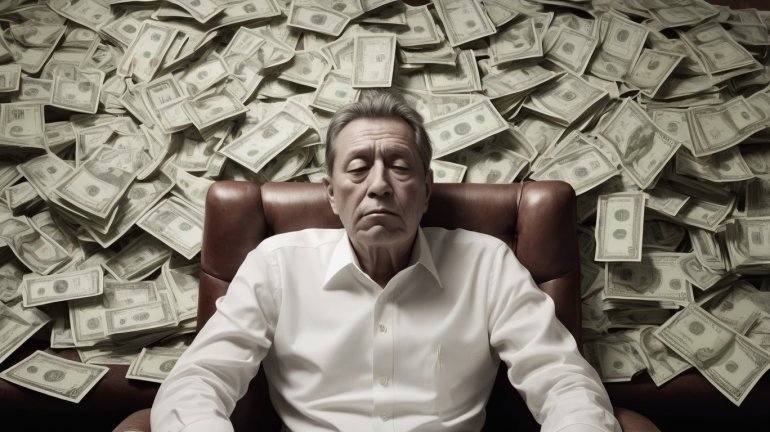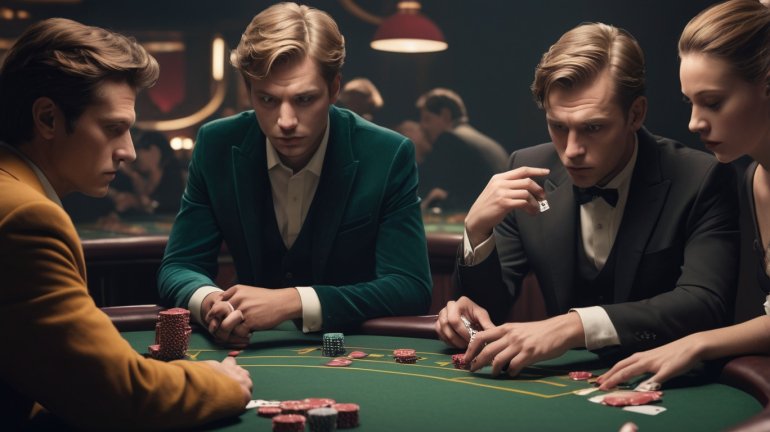
Gambling has been a part of human culture for millennia, offering the thrill of risk and the promise of reward. For most, it's an occasional pastime, but for others, it becomes a consuming addiction that can devastate lives. To truly understand gambling addiction, we must look beyond the surface behaviors and delve into the intricate workings of the human mind.
At the heart of gambling addiction lies a complex interplay of psychological factors, and among these, cognitive biases play a crucial role. Cognitive biases are systematic errors in thinking that affect people's judgments and decisions. While often useful daily, these mental shortcuts can lead us astray, especially in high-stakes gambling.
Imagine a roulette player who, after seeing red appear five times in a row, becomes convinced that black is "due" to appear next. This belief, known as the gambler's fallacy, is just one of many cognitive biases that can fuel addictive gambling behavior. These biases distort our perception of probability, risk, and control, creating a warped view of reality that can keep a gambler coming back to the table long after logic dictates otherwise.
In this article on Casinoz, we will explore how various cognitive biases contribute to the development and persistence of gambling addiction. By understanding these mental traps, we can gain valuable insights into why gambling addiction is so powerful and challenging to overcome. Moreover, this knowledge can inform more effective approaches to prevention, treatment, and recovery.
Understanding Cognitive Biases
To grasp how gambling addiction takes hold, we must first understand the nature of cognitive biases. These mental phenomena are more than simple errors in thinking; they are systematic patterns of deviation from norm or rationality in judgment that occur in specific situations.
Definition and Explanation of Cognitive Biases
Here is the definition of the term:
Cognitive biases are mental shortcuts or heuristics that our brains use to process information and make decisions quickly.
While these shortcuts can be helpful in many situations, allowing us to navigate complex environments efficiently, they can also lead to significant errors in judgment and decision-making.
These biases arise from various processes that are often subconscious:
- information processing shortcuts,
- emotional and moral motivations,
- social influence,
- limitations in the mind's ability to process information.
It's crucial to understand that cognitive biases do not indicate low intelligence or irrationality. They affect everyone, regardless of education or intellectual capacity. They're a natural by-product of our brain's attempt to simplify the vast amount of information we encounter daily.
How Cognitive Biases Affect Decision-Making
Cognitive biases can profoundly impact our decision-making processes, often without our awareness. They can cause us to:
- overestimate or underestimate probabilities,
- make decisions based on emotions rather than facts,
- give more weight to information that confirms our existing beliefs,
- perceive patterns where none exist,
- misinterpret or misremember past events.
In the context of gambling, these biases can lead to a distorted perception of risk and reward, causing individuals to make irrational bets or continue gambling despite mounting losses.
The Challenge of Overcoming Cognitive Biases
Recognizing and overcoming cognitive biases is no easy task. To illustrate this difficulty, consider the analogy of optical illusions. Even when we know that an optical illusion is tricking our eyes, we often can't help but see it. Similarly, cognitive biases can persist even when we're intellectually aware of their existence.
This persistence is due to several factors:
- Many biases operate at a subconscious level.
- They're deeply ingrained in our thought processes.
- They can serve useful purposes in other contexts.
- Our brains are naturally resistant to changing established patterns of thinking.
Awareness is the first step in combating cognitive biases, but it's often insufficient. Like someone trying to see past an optical illusion, individuals struggling with gambling addiction may intellectually understand their biased thinking but still struggle to overcome it in the heat of the moment.
Understanding cognitive biases is critical for comprehending the psychological underpinnings of gambling addiction. As we delve deeper into specific biases in the following sections, we'll see how these mental shortcuts can combine to create a powerful drive towards addictive gambling behavior and why addressing these biases is key to effective treatment and prevention strategies.
Gambling and Cognitive Distortions
Gambling provides a perfect storm for cognitive biases to flourish. The combination of uncertainty, risk, and potential reward creates an environment where our minds are particularly susceptible to distorted thinking.
How Cognitive Biases Manifest in Gambling Behavior
In gambling contexts, cognitive biases can lead to a range of irrational behaviors:
- overestimating the probability of winning,
- underestimating the impact of losses,
- believing in "lucky" numbers or rituals,
- chasing losses in an attempt to break even,
- attributing wins to skill and losses to bad luck.
These distortions in thinking can turn occasional gambling into problematic behavior. A gambler affected by cognitive biases might continue to play despite mounting losses, convinced that a big win is just around the corner. They might spend more time and money gambling than they can afford, justified by distorted perceptions of probability and control.
It's important to note that these biases affect both novice and experienced gamblers. Those with more gambling experience may be even more susceptible to certain biases, as they may have developed a false sense of expertise or control over games of chance.

Wagenaar's Study on Gamblers' Decision-Making Rules
In 1988, psychologist Willem Albert Wagenaar conducted a groundbreaking study that shed light on the cognitive processes underlying gambling behavior. His research, published in the book "Paradoxes of Gambling Behaviour," identified 16 cognitive rules that gamblers commonly use when making decisions.
Wagenaar's study was significant because it systematically cataloged how gamblers' thinking deviates from rational decision-making. Some of the key rules he identified include:
- Flexibility: Gamblers adapt their betting strategies based on perceived patterns.
- Biased evaluation of outcomes: Wins are often attributed to skill, while losses are blamed on bad luck.
- Fixation on the absolute frequency of wins: Focusing on the number of wins rather than the overall win-loss ratio.
- Illusion of control: Believing that personal actions can influence random events.
- Gambler's fallacy: Expecting that a run of bad luck must end soon.
- Entrapment: Continuing to gamble to justify previous losses.
These rules, which we'll explore in more detail in the following sections, demonstrate how cognitive biases can create a self-reinforcing cycle of problematic gambling behavior.
Wagenaar's work laid the foundation for much of our current understanding of the cognitive aspects of gambling addiction. It highlighted the need to address these distorted thought patterns in prevention and treatment strategies.
Key Cognitive Biases in Gambling Addiction
While numerous cognitive biases can influence gambling behavior, several stand out for their particularly strong impact on the development and maintenance of gambling addiction. Let's explore these key biases in detail.
Illusion of Control
The illusion of control is the tendency for people to overestimate their ability to control events, particularly in situations where they have little or no actual control.
A slot machine player believes they can influence the outcome by pressing the button at the right moment.
A craps player thinks that throwing the dice in a specific way will increase the chances of winning.
This bias can lead gamblers to believe they have more skill or influence over games of chance than they actually do, encouraging them to continue playing and potentially increasing their bets.
Gambler's Fallacy
The gambler's fallacy is the mistaken belief that if something happens more frequently than normal during a given period, it will happen less frequently in the future (or vice versa).
The Monte Carlo Casino incident of 1913 demonstrates this bias. A famous example occurred when the ball in a roulette wheel landed on black 26 times in a row. Players lost millions betting against black, believing that red was "due" to come up.
This fallacy can keep gamblers playing long after they should quit, as they believe a change in their luck is imminent based on past events.
Sunk Cost Bias
The sunk cost bias is the tendency to continue an endeavor once an investment in money, effort, or time has been made, even when continuing is not the best option.
Gamblers often feel compelled to keep playing to "recover" their losses, not wanting to "waste" the money they've already spent.
This bias can lead to a vicious cycle of escalating bets and mounting losses as gamblers try to recoup their previous investments.
Representative Bias
Representative bias is the tendency to judge the probability of an event by how closely it resembles similar events. For example, believing that a certain sequence of numbers in a lottery is more likely to win because it "looks" random or expecting a slot machine to pay out soon because it hasn't for a while.
This bias can lead to poor judgment of probabilities and encourage continued play based on false patterns.
Illusory Correlations
Illusory correlations occur when people perceive a relationship between variables even when no such relationship exists.
Many gamblers always wear "lucky" items of clothing when gambling. They also may perform a specific ritual before placing a bet.
These false correlations can reinforce gambling behavior by creating a sense of control and predictability in inherently random situations.
Fixation on Absolute Frequency of Successes
This bias involves focusing on the total number of wins rather than the ratio of wins to losses or the overall net outcome.
A gambler might boast about winning 20 times in a night, neglecting to mention they lost 40 times and are overall at a significant loss.
By focusing solely on wins, gamblers may develop an overly optimistic view of their gambling success, encouraging them to continue despite overall losses.
Each of these biases contributes to the complex psychology of gambling addiction. They work together to create a distorted perception of reality that can keep individuals trapped in problematic gambling behaviors.

The Cumulative Effect of Cognitive Biases
While each cognitive bias we've discussed can significantly influence gambling behavior on its own, the true power of these mental distortions lies in their cumulative effect. When multiple biases interact, they create a complex web of irrational thinking that can be incredibly difficult to escape.
How Multiple Biases Interact to Reinforce Addictive Behavior
The interplay of cognitive biases in gambling addiction often follows a pattern that reinforces problematic behavior.
- Initial engagement: The illusion of control and representative bias might draw a person into gambling, making them feel they can predict or influence outcomes.
- Continued play: As losses occur, the gambler's fallacy kicks in, convincing the individual that a win must come soon. This is often coupled with the sunk cost bias, which pushes them to keep playing to recover losses.
- Rationalization: Illusory correlations help the gambler explain away losses, and attribute wins to skill or luck. At the same time, fixation on the absolute frequency of successes allows them to focus on wins and ignore overall losses.
- Escalation: As these biases work together, the gambler may increase bets or frequency of play, leading to more significant losses and stronger engagement of the sunk cost bias.
- Addiction cycle: The combination of these biases creates a self-reinforcing cycle. Each bias supports and amplifies the others, making it increasingly difficult for the individual to recognize the irrationality of their behavior.
Here is an example scenario. Consider gamblers who believe they have exceptional skill (illusion of control). After a string of losses, they think they're "due" for a win (gambler's fallacy) and continue playing to recover their losses (sunk cost bias). They focus on their occasional wins (fixation on the absolute frequency of successes) and attribute them to their lucky chair (illusory correlation), ignoring their overall net loss. This distorted thinking keeps them playing, deepening their addiction.
The Challenge of Breaking Free from Mental Traps
The cumulative effect of these biases creates several significant challenges for individuals trying to overcome gambling addiction.
- Reinforced beliefs: Each bias tends to support and strengthen the others, creating a robust network of false beliefs that resist change.
- Selective attention and memory: These biases influence what information gamblers pay attention to and remember, further distorting their perception of their gambling experiences.
- Emotional investment: The combination of biases can create a strong emotional attachment to gambling, making it difficult to approach the activity rationally.
- Normalization of irrational thinking: Over time, these distorted thought patterns can become habitual, feeling normal and logical to the individual despite their irrationality.
- Resistance to contradictory evidence: The network of biases can make individuals highly resistant to information or experiences that contradict their beliefs about gambling.
- Difficulty in self-recognition: The pervasive nature of these biases can make it challenging for individuals to recognize their own distorted thinking, even when they can identify it in others.
Understanding the cumulative effect of cognitive biases highlights the need for comprehensive approaches that address multiple biases simultaneously and help individuals recognize the interconnected nature of their distorted thinking.

Strategies for Overcoming Cognitive Biases in Gambling
Addressing cognitive biases is crucial in treating and preventing gambling addiction. While these biases are deeply ingrained and challenging to overcome, several strategies have shown promise in helping individuals recognize and combat their distorted thinking patterns.
Education and Awareness
Here are several tips.
- Understanding Probability: Teach basic principles of probability and statistics to help gamblers understand the true odds of games. Use visual aids and simulations to demonstrate how random events work over time.
- Bias Recognition Training: Provide examples of common cognitive biases in gambling contexts and encourage self-reflection to identify personal biases.
- Financial Literacy: Educate about the long-term financial impact of gambling. Teach budgeting skills and responsible money management. Implementation:
These educational strategies can be incorporated into school curricula, public health campaigns, and addiction treatment programs. They aim to create a foundation of knowledge that can help individuals critically evaluate their gambling behavior.
Cognitive-Behavioral Therapy Approaches
Therapy can be especially helpful.
- Cognitive Restructuring: Identify and challenge irrational beliefs about gambling. Develop more realistic thought patterns.
- Behavioral Experiments: Design safe experiments to test the validity of gambling-related beliefs. Use journaling to track outcomes and reflect on experiences.
- Exposure Therapy: Gradually expose individuals to gambling cues without engaging in gambling behavior. Teach coping strategies to manage urges.
- Relapse Prevention: Identify personal triggers and high-risk situations. Develop action plans for managing cravings and avoiding relapse.
These techniques are typically employed in individual or group therapy sessions led by trained mental health professionals. They focus on changing both thought patterns and behaviors related to gambling.
Mindfulness and Metacognitive Techniques
The mind is a powerful tool, too.
- Mindfulness Meditation: Practice present-moment awareness to interrupt automatic thought patterns. Develop emotional regulation skills to manage gambling urges.
- Metacognitive Training: Enhance awareness of one's own thought processes. Learn to observe thoughts without automatically acting on them.
- Cognitive Defusion: Practice techniques to create distance from gambling-related thoughts. Recognize thoughts as mental events rather than facts.
- Values Clarification: Identify personal values and how gambling aligns or conflicts with them. Use value-based decision-making to guide behavior.
These approaches can be taught in therapy settings, through mindfulness-based programs, or via self-help resources. They aim to cultivate a more aware and intentional relationship with gambling-related thoughts.
Environmental and Social Strategies
Here are some more methods of combating cognitive biases in gambling.
- Self-Exclusion Programs: Utilize casino and online gambling self-exclusion options. Set up blocking software for online gambling sites.
- Social Support: Engage with support groups like Gamblers Anonymous. Build a network of non-gambling social connections.
- Alternative Activities: Develop new hobbies and interests to replace gambling behavior. Create a structured schedule to reduce idle time.
- Financial Controls: Set up bank account restrictions or involve a trusted person in financial management. Use apps or tools to track spending and set limits.
These strategies involve making changes to one's environment and social circle to support recovery. They often require ongoing effort and support from family, friends, or professionals.
Conclusion
As we've explored throughout this article, cognitive biases play a pivotal role in the development and maintenance of gambling addiction. These systematic errors in thinking, including the illusion of control, gambler's fallacy, sunk cost bias, representative bias, illusory correlations, and fixation on the absolute frequency of successes, work in concert to create a distorted view of reality. This warped perspective can lead individuals to make irrational decisions, perpetuating the cycle of problematic gambling behavior.


























